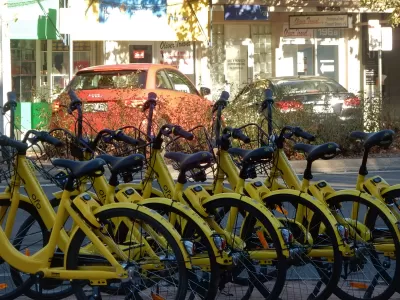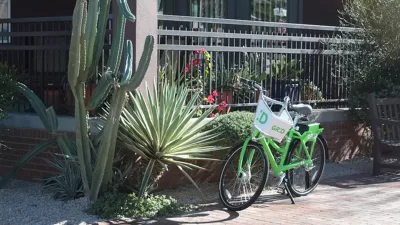The Chinese company seemed to be dominating its corner of the shared mobility market—until its dramatic downfall.

Ofo bikes were once ubiquitous in China and located in over 20 other countries around the world, but the company now may be headed toward bankruptcy. "Ofo was a phenomenon. Its dockless bicycles, which could be picked up by scanning a QR code and left anywhere, grew from Beijing campuses to become an icon of young, urban cool. The firm garnered a valuation of US$2-billion," report Pei Li and Josh Horwitz.
The specific cause of Ofo’s problems isn’t entirely clear. The company grew quickly, and some say it happened too fast. Ofo also faced a host of smaller competitors, many of which have gone out of business, and the fight to stay on top contributed to cost overruns. In addition, a plan to expand into Japan fell through, and its operations have been hindered by local traffic regulations and vandalism.
The Ofo situation has Chinese tech investors worried, and Chinese consumers are unhappy as well. "In China, once-loyal users have turned on Ofo, lining up at its offices in Beijing to demand the return of deposits paid upfront to use the service. More than 12 million people have so far requested repayment online," say Li and Horwitz.
FULL STORY: The rise and fall of bike-sharing company Ofo is a lesson for China’s tech investors

Planetizen Federal Action Tracker
A weekly monitor of how Trump’s orders and actions are impacting planners and planning in America.

Map: Where Senate Republicans Want to Sell Your Public Lands
For public land advocates, the Senate Republicans’ proposal to sell millions of acres of public land in the West is “the biggest fight of their careers.”

Restaurant Patios Were a Pandemic Win — Why Were They so Hard to Keep?
Social distancing requirements and changes in travel patterns prompted cities to pilot new uses for street and sidewalk space. Then it got complicated.

Albuquerque Route 66 Motels Become Affordable Housing
A $4 million city fund is incentivizing developers to breathe new life into derelict midcentury motels.

DC Area County Eliminates Bus Fares
Montgomery County joins a growing trend of making transit free.

Platform Pilsner: Vancouver Transit Agency Releases... a Beer?
TransLink will receive a portion of every sale of the four-pack.
Urban Design for Planners 1: Software Tools
This six-course series explores essential urban design concepts using open source software and equips planners with the tools they need to participate fully in the urban design process.
Planning for Universal Design
Learn the tools for implementing Universal Design in planning regulations.
Heyer Gruel & Associates PA
JM Goldson LLC
Custer County Colorado
City of Camden Redevelopment Agency
City of Astoria
Transportation Research & Education Center (TREC) at Portland State University
Camden Redevelopment Agency
City of Claremont
Municipality of Princeton (NJ)



























